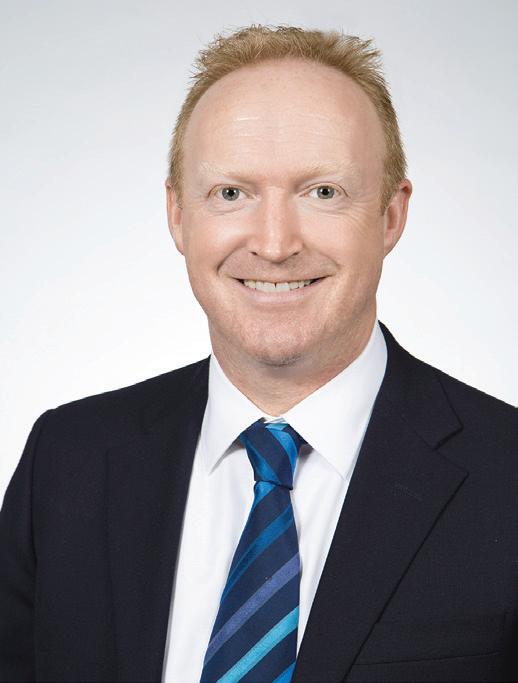
4 minute read
Staying Strong
StrongSecureMD persists through COVID-19 and delivers care to vulnerable populations By Raymond Hino
Delivering care safely was a complicated issue for providers during the pandemic. When the population you serve is also incarcerated, that only adds to the complexity. This was the situation SecureMD found itself in in March 2020, and with resilience and support from its GI industry partners, it persevered.
What is SecureMD?
SecureMD Professionals (SMD) of California is a unique business model, which delivers GI procedures and FibroScan procedures to the California state prison inmate population. A PE GI Solutions partner since 2013, SecureMD brings a full team of medical professionals, including one board-certified gastroenterologist, one certified registered nurse anesthetist (CRNA), one registered nurse and two GI technicians inside prisons each day. The mobile GI team travels frequently to 15 of the 35 state prisons in California, spanning the Oregon border to the Mexico border, about the distance from New York City to Jacksonville, Florida. The SecureMD team arrives at each prison in a van that is fully stocked with GI scopes, monitors, processor units, and supplies (on mobile carts), and is prepared to perform cases on up to 15 inmates in clinical spaces provided by the prisons.
Before COVID-19 interrupted the business model, SecureMD averaged 10–12 GI cases per day and 14–15 FibroScan cases per day. GI volumes were consistently increasing—so much so that the team took the plunge to invest in a second van, stocked with equipment, and increased staff.
A Challenging Year
At the onset of the COVID-19 pandemic, SecureMD’s biggest concern was the safety of staff as well as patients. Like PE partner centers and practices across the country, SecureMD had limited access to personal protective equipment (PPE), as it is not considered a hospital, an office, or even a clinic. Thankfully, SecureMD leaned on PE GI Solutions’ considerable supply chain strength and resources to obtain N95 masks, goggles, and impervious gowns for the team.
Soon after safety concerns were mitigated with increased PPE, a new and more significant obstacle arose: being denied access to most of the prisons. In March 2020, the State Department of Correctional Health issued guidance postponing elective procedures but left the decision to allow necessary diagnostic colonoscopies and alike procedures up to individual prisons. With this news, SecureMD chose to stay open in the most uncertain times of the pandemic last spring.
Unfortunately, many individual prisons did choose to cancel GI procedures as the pandemic raged on throughout the state of California. In July, one of the largest COVID outbreaks in the entire U.S. hit San Quentin State Prison, California’s oldest prison. At the time, San Quentin had 2,159 confirmed COVID cases out of the entire inmate population of 3,500. From April through August, SecureMD averaged only 58 GI cases per month, a 66% reduction from its 2019 average of 175 cases per month.
Fall 2020 brought more widespread COVID-19 testing and a brief relief in COVID-19 case numbers. Slowly, SecureMD began approaching old volumes, hitting 131 cases in October. However, a new wave drove cases in prisons back up, and the team closed the year in December with only 59 cases for the month. From April 2020 to January 2021, SecureMD averaged 75 cases per month, 43% of pre-pandemic volume.
Back on a Growth Path
Like many gastroenterologists across the country, Medical Director Edward Wong, MD, had never seen drops in procedure volume this severe before. Still, the SecureMD team chose to persevere and deliver care for the few prison clients that did remain accessible.
“It was an easy decision,” says Dr. Wong, “How could we deny essential preventative care to the inmates in the few prisons that did still allow access?”
— Edward Wong, MD, Medical Director, SecureMD
Employees at SecureMD provided CRC screenings to inmates during the COVID-19 pandemic.
In California, every inmate is required to have a colonoscopy at age 50 and then follow-ups.
“We knew the need was still there from this population, and the need will only grow,” adds Dr. Wong. Growth is an understatement. California’s prison population is aging rapidly, with the share of prisoners over 50 having grown from 4% to 23% from 2000 to 2017.
“We could not have bounced back so quickly alone,” says Dr. Wong. PE GI Solutions supported SecureMD over the past year’s unstable journey, with PE’s Finance team helping to secure two Paycheck Protection Program (PPP) loans for SecureMD over the course of the pandemic. These sources of income proved critical in keeping SecureMD viable over the past year. Additionally, SecureMD made other bold moves to survive: It recently changed anesthesia companies as a cost-saving measure that has proved very successful. It also increased communication with the state of California, which provided close guidance on re-entering prisons as soon as possible. Lastly, the team leaned on the prisons themselves, which graciously agreed to vaccinate the SecureMD staff as soon as possible.
In the short term, getting volume back on track to begin sending two vans into the field every day is SecureMD’s main priority. RN Leader Theresa Dunaway, who joined the team in January eager to support the care of vulnerable populations, says, “I have always been passionate about inmate healthcare, and feel I joined SecureMD at a challenging, but exciting time. We are on the verge of huge growth.” SecureMD already has plans to begin servicing two new prisons it had not previously visited to get inmates caught up on postponed procedures.
Raymond Hino, MPA, FACHE, is Vice President of Operations at PE GI Solutions.









